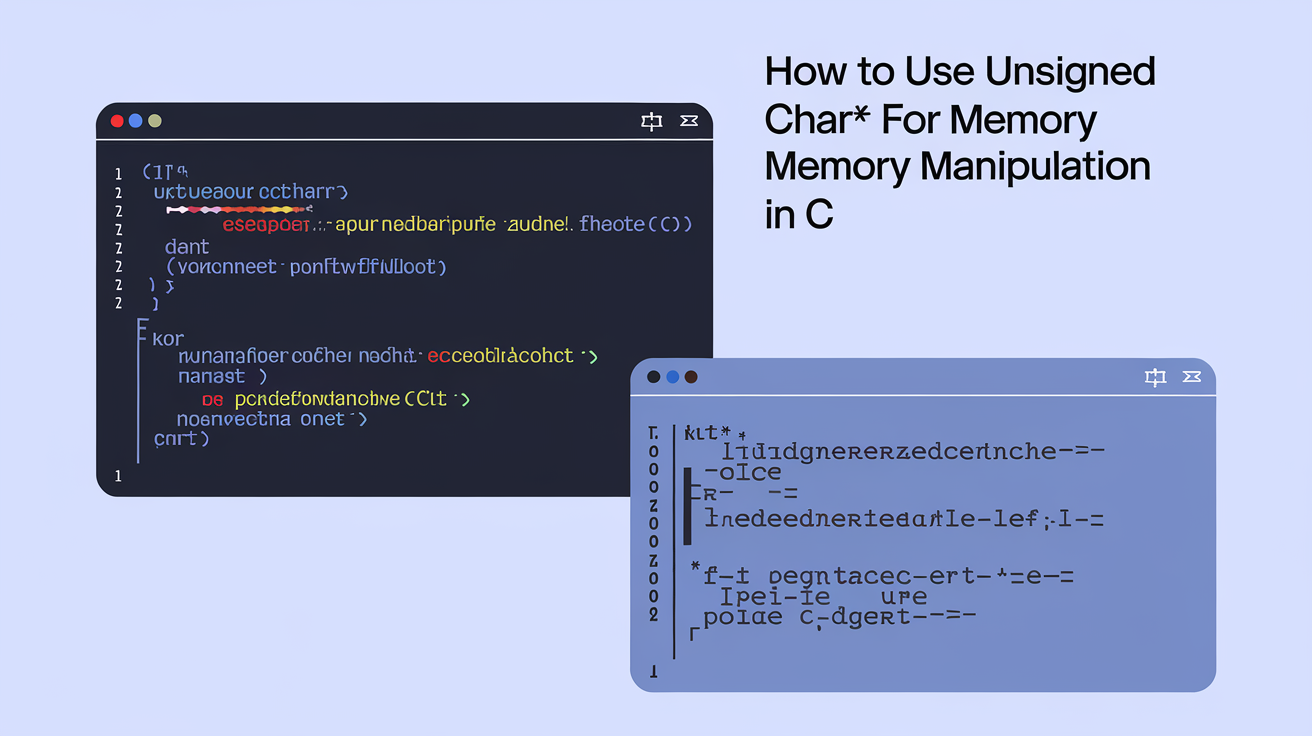How to Use unsigned char* for Memory Manipulation in C
 Zouhair Grir
Zouhair Grir
What is unsigned char* in C and Why Do We Use It?
In C programming, memory manipulation is an important task. One way to work with memory is by using the unsigned char* type. This type allows you to treat memory as a series of bytes, which is useful when you need to modify or inspect data directly.
What Does unsigned char* Mean?
unsigned charis an 8-bit data type, which means it can hold a number between 0 and 255. It is "unsigned," meaning it doesn't include negative numbers.Pointer (
*): When we useunsigned char*, it means we're dealing with a pointer, which is a variable that holds the memory address of some data.
By using unsigned char*, you are telling the computer that you want to work with memory byte by byte.
Why Use unsigned char*?
Work with Raw Data:
unsigned char*is great for working with raw memory, like in files or networks, where we deal with data at the byte level.Safer for Memory Manipulation: Since
unsigned charonly handles values between 0 and 255, we avoid dealing with negative numbers, making it safer for memory-related tasks.
Example: ft_bzero Function
Let’s look at the ft_bzero function, which clears (sets to zero) a block of memory. Here’s the code:
#include <stddef.h>
void ft_bzero(void *b, size_t len)
{
unsigned char *str = (unsigned char *)b; // Cast memory to unsigned char*
while (len > 0)
{
str[len - 1] = 0; // Set each byte to 0
len--;
}
}
What Happens Here:
The function takes two parameters:
void *b, which is a pointer to some memory, andlen, which tells us how many bytes to zero out.We cast
btounsigned char*so we can work with the memory byte by byte.The
whileloop sets each byte in the memory to0.
Another Example: ft_memset
Here’s a similar function, ft_memset, which sets a block of memory to a specific value:
#include <stddef.h>
void *ft_memset(void *b, int c, size_t len)
{
unsigned char *str = (unsigned char *)b; // Cast memory to unsigned char*
while (len > 0)
{
str[len - 1] = (unsigned char)c; // Set each byte to the value of c
len--;
}
return b;
}
Explanation:
In this function, we can set each byte in the memory to a specific value (
c), not just zero.The
unsigned char*helps us access and modify memory one byte at a time, making it useful for tasks like initializing memory.
Why Not Use char*?
You might ask, "Why not just use char*?" The answer is that char* can sometimes be signed, meaning it can hold negative values, which we don’t want when working with raw memory. Using unsigned char* ensures we only deal with positive numbers (0-255), which is what we usually want when working with memory or binary data.
Conclusion
unsigned char* is a powerful tool for memory manipulation in C. It lets you work with data at the byte level, which is essential when clearing memory (like in ft_bzero) or setting memory to specific values (like in ft_memset). By using unsigned char*, you can ensure safe and efficient memory operations in your programs.
Subscribe to my newsletter
Read articles from Zouhair Grir directly inside your inbox. Subscribe to the newsletter, and don't miss out.
Written by

Zouhair Grir
Zouhair Grir
I'm GRIR Zouhair, a dedicated and experienced Full-Stack Developer from Morocco. With a strong passion for coding and a knack for solving complex problems, I excel in creating robust and scalable web applications. My expertise spans across both front-end and back-end technologies, allowing me to deliver comprehensive and seamless solutions.